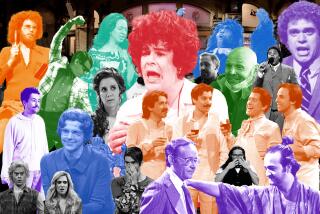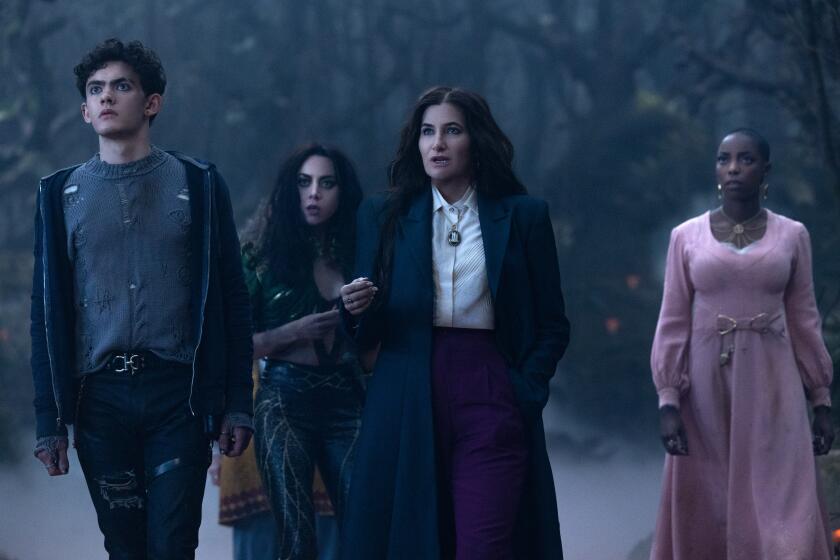Repertory Theater Makes a Play for Deaf : Company Arranges Matinee to Bring New Experience to Many of Hearing-Impaired
The match seemed like a natural.
On the one hand, South Coast Repertory in Costa Mesa is running a play with a deaf character, played by one of the nation’s leading deaf actresses. On the other, in the surrounding community of Orange County there are an estimated 20,000 deaf people for whom theater is usually a foreign experience. Why not bring them together?
Saturday it will happen: A matinee performance of Beth Henley’s “The Debutante Ball” featuring Tony Award winning deaf actress Phyllis Frelich will be interpreted in sign language for the deaf and hearing-impaired.
Two interpreters will be stationed on each side of the stage. And nearly 200 seats have been reserved in strategic locations to provide an easy sight line from the interpreters to the stage, avoiding an uncomfortable “tennis match” head motion. It is believed to be the first interpreted performance by a professional theater in Orange County.
“To me, it’s very important. There’s a large deaf population that deserves to be served, and it signified South Coast Repertory’s willingness to accommodate deaf people,” said Bob Daniels, a hearing-impaired actor and free-lance consultant from Los Angeles, hired by SCR to direct Saturday’s interpreters and help set up the performance. “This will be an effort to find out how many will take an interest in going to the theater.”
To encourage deaf theatergoers, SCR is offering discounts for groups of 10 or more. And a telecommunications device for the deaf (TDD) has been installed in the box office temporarily. The device, on loan from the Dale McIntosh Center for the Disabled, can accept calls from compatible devices on the phone number 957-4033 V/TDD.
The Mark Taper Forum in Los Angeles has offered a signed performance of every production the last six years through Project DATE (Deaf Audience Theater Experience). Recently, 1,500 deaf people attended the five signed performances of Mark Medoff’s “The Hands of Its Enemy,” a play about the tempestuous relationship between a deaf playwright (played by Frelich) and her hearing director (Richard Dreyfuss). The Forum now has 80 deaf subscribers, said Daniels, who consults at the Taper.
Like others who are hard of hearing, Daniels said his enjoyment of a theatrical performance is cut at least in half when he can’t understand a word that is spoken. Even when watching an interpreted performance, he said, it’s difficult to follow the action without any background.
Workshop Planned
Prior to the 2:30 p.m. performance Saturday, a 1 p.m. workshop will be conducted by deaf actress Freda Norman. Since theater is a first-time experience for many deaf people, topics will cover the basics such as costumes, lighting transitions, the purpose of the set and the concept behind the play. In addition, particular signs that have been created for the characters will be introduced. For example, the deaf character of Frances, played by Frelich, will be identified throughout the performance by the signed letter “P” (for Phyllis) tapped on the chin, said Daniels.
Signers Francine Stern and Gary Sanderson, both of Los Angeles, will interpret the dialogue in Pidgin Sign English, a shorthand sign language used to save the time and expense of translating the play into American Sign Language, the primary language of most deaf people, said Daniels.
More popular with deaf theatergoers than interpreted performances, said Daniels, are performances by the National Theater of the Deaf in which plays are done entirely in American Sign Language by the actors themselves. Not only is the language less stilted than the transliterated Pidgin Sign English, but it also can include mannerisms and cultural jokes, such as plays on signs (like plays on words) understood only by sign language speakers, he said.
But in the past five years, more mainstream plays are being interpreted for deaf audiences, as more have included deaf characters. “One reason is because of Phyllis and the Tony,” said “Debutante” director Stephen Tobolowsky, who lives with playwright Henley. Frelich won the award for her starring role in Mark Medoff’s “Children of a Lesser God,” a play about a militant deaf student and her antagonistic relationship with a hearing teacher at a school for the deaf. The play was a “crossover hit” that, according to Tobolowsky, appealed to hearing as well as deaf theatergoers.
Henley said she was so taken with Frelich’s “presence and energy” in a New York production of “Children of a Lesser God,” that she wrote the part of Frances in “Debutante Ball” precisely for the deaf actress. “I thought it was a shame there wasn’t more she could do,” said Henley, who was awarded the Pulitzer Prize for her play “Crimes of the Heart.”
“Debutante Ball” focuses on the unfulfilled dreams of a Southern family reunited for the coming out of a daughter. Its themes center on loneliness and estrangement and the need to share and be a part of other people’s lives, Henley said. The deaf character of Frances might serve as a metaphor, she said. Frelich’s character Frances is an uneducated country farm girl whose mother sends her to visit the family and attend the ball in hopes she will find a husband.
In the play, Frelich has several spoken lines. During rehearsals, Frelich told Tobolowsky she could make the speaking clear if he wanted. But it wasn’t necessary, he indicated. “The point is, the other characters can’t understand her,” said Tobolowsky. The first time anyone appears to communicate in the play is when Frances makes the sign for help and is understood.
Frelich’s voice is expressive and full of emotional timbres, said Henley. In real life, however, Frelich said her voice is not part of her communication. The deaf child of deaf parents, Frelich was raised as a signing person, she explained through her husband Bob Steinberg, a former stage manager for the National Theater of the Deaf, who acts as her interpreter.
“I do enjoy playing this role very much,” said Frelich, 41. “It’s more free, more loose. Everything I’ve played before I guess you could say is more serious, more intellectual.”
A founding member of the National Theater of the Deaf, Frelich has been acting professionally for 18 years. Sign language theater, she said, was a “great step for deaf people. I feel I got the training there which allowed me to go out and do the things I’m doing now, more in the mainstream.”
The play has no particular message for deaf people, she said. Her character is just “part of the complicated fabric of this play.” But she said she was grateful to Henley for having written the role for her. “I’m happy to be in anything good,” she said. “I just want to keep working and make a living.”
Seeing a Laugh
Frelich said the single biggest difference for her as a non-hearing actress is that she doesn’t have the close relationship with an audience that a hearing actor would. “I can see a laugh as much as a hearing actor can hear one. It’s just different.
“On the other hand, maybe it’s to my advantage. I’m totally involved with my life on the stage and not concerned with them (the audience). I’m able to concentrate better.”
During rehearsal, Lisa Spell, Communications Coordinator of the Dale McIntosh Center for the Disabled, served as Frelich’s interpreter. Because of her apparent isolation, others were nervous at first about working with her, said Tobolowsky who learned sign language in order to communicate with her. But Frelich “tries to understand and listens so well that after a few weeks, our nervousness melted into ease,” he said. Some cast members picked up sign language, but others found out “you can communicate without sign,” he said.
Once, Tobolowsky said, he related to Frelich that he had had a dream in which they were eating ice cream. Frelich, he said, interrupted the story and asked in sign whether she had spoken in his dream. He said yes, she did. Frelich signed back: Well, maybe next year.
Although Daniels and Frelich believe Saturday’s signed performance is important for the deaf community, Tobolowsky and SCR general manager Tim Brennan believe it is also important to expand the theater audience.
Whether the experiment is successful will depend less on the numbers of deaf people who turn out but more on the reaction of those who do, said Brennan. At 5 p.m., the audience may participate in a post-performance discussion with Frelich. Those who respond favorably may serve as ambassadors to the rest of the deaf community, said Brennan.
If it works, SCR may continue to work with Daniels to choose plays that are particularly suitable for signing, or institute a signed performance of every production, he added.
“This is an opportunity to establish a link with the deaf community,” said Brennan. “We’ll see how this goes.”
More to Read
The biggest entertainment stories
Get our big stories about Hollywood, film, television, music, arts, culture and more right in your inbox as soon as they publish.
You may occasionally receive promotional content from the Los Angeles Times.










